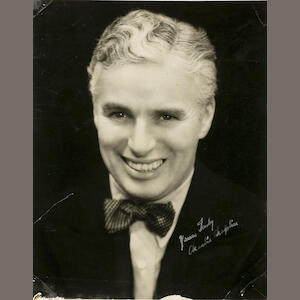Charlie Chaplin, the man most known for his character the Tramp, was a man who you could say was filled with contradictions. He was a brilliant actor who portrayed feelings on screen that could evoke all sorts of emotions from the viewer, but he was also a creative writer and director who was able to be control of his films. On the other hand, he was known to be difficult at times. He was a man who rarely liked to be interviewed or filmed without his famous Tramp makeup and outfit on. In some ways, he liked the private life, and in others he was the most recognizable face in Hollywood. Unfortunately, he was not always far from scandal.
 |
|
While his time in Hollywood, he was married four times, and was known to have affairs. One incident in particular involved a woman named Joan Barry with whom he had an affair in 1942. He soon ended it. She came back with a paternity suit, demanding child support for "their child". There was a paternity test conducted, but it came back negative for Chaplin. So, he may have been out of woods with Barry, but his career took a blow.
The biggest scandal of Chaplin's career ended with the US government revoking his visa and not allowing him to return to the United States. Dating back to the 1930's, some were critical of the star's views that were presented in his films. One of Chaplin's biggest hits was the film "Modern Times", released in 1936. Some pointed to this movie as Chaplin's propaganda film praising communism. J. Edgar Hoover, head of the FBI, opened a file on Chaplin (as he did with many celebrities that he had issues with). Even though he made the highly satirical film "The Great Dictator" (satire on Hitler) in 1940 which was looked at as a uniquely pro-Allies movie, comments of his about the war raised eyebrows in the government. He attracted the attention of HUAC (House Un-American Activities Committee) and also Senator McCarthy, who was running his own investigations. HUAC threatened to subpoena Chaplin to get him to testify, but they never went through with it since Chaplin would easily lampoon through the questioning. There were documents showing that as early as the late 1940's, the government was trying to end his residency in the US.
 |
| A photo of Charlie Chaplin taken in 1952 |
In 1952, Chaplin left for his home country of England for the premiere of his latest film, "Limelight". Upon his return, Hoover and FBI had worked a deal out with the Immigration and Naturalization Service to pull his re-entry permit. Because of this, Chaplin was not legally able to return to the US. But did he know it was coming? Some say yes and some say no. Either way, he couldn't come back. He lived the rest of his life abroad, settling on Switzerland. The political climate of the 1960's took away any focus of Chaplin's politics and instead only showed on his work. But still he could not return to the US. He didn't make as many new movies and instead focused on re-releases of his older works. He continued working for as long as he could, but strokes limited his ability to work.


No comments:
Post a Comment